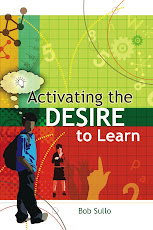In Chapter 3 of the revised edition of
The Inspiring Teacher, I discuss the
contributions of Lawrence Kohlberg, Jean Piaget, and Erik Erikson, major
contributors to our understanding of human development. But there is less
heralded group that seems to naturally appreciate the importance of the
developmental process and accepting kids where they are: grandparents.
I am not currently a grandparent, and don’t believe
my status is about to change. In thinking about people I know who are
grandparents: siblings, colleagues, friends, they are a widely heterogeneous
lot. Yet…when it comes to their grandchildren, they share the following
characteristics:
- An abiding and unambiguous love and support of children;
- An appreciation of children whether they are “above the norm,” “at
the norm,” or “below the norm.” (It is true that grandparents are more
likely to cite “evidence-based” findings when their grandchild
happens to fall in the “above the norm” category and drop their “you can’t
believe the statistics” position.)
- An understanding that development is not linear: there are fits and
starts. While school principals fret when kids score below expectations
and school board officials understandably focus on the possible impact on
AYP, grandparents generally believe that “They’ll be just fine. Don’t
worry.” Any you know what? More often than not, they are right. In Brain-Based
Learning & Teaching, research
cited by Eric Jensen reports that typical students in a classroom – those
without significant developmental challenges or handicaps – can vary by as
much as three years when it comes to development. Grandparents accept that
kids develop at different rates and don’t push the panic button
unnecessarily.
- Finally, grandparents may be exhausted after spending time with
their grandchildren, but they typically spend their time with them engaged
in hands-on activities involving the movement that enhances long-term
learning and memory.
Piaget. Erikson. Kohlberg. Each of them giants who
contributed significantly to our understanding of human development and offer
suggestions about how to promote healthy growth. They deserve our thanks. One
group that seems particularly adept at putting their ideas into effective
practice is grandparents, experts in unconditional love and a reluctance to
hurry the developmental process.
***
As always, if you enjoyed this and found it useful, please
send the link to your friends. Thanks.
Bob Sullo
PO Box 1336
Sandwich, MA 02563
For information about books by Bob Sullo and to schedule a
keynote, workshop, or series for your school, agency, or parent group visit
www.internalmotivation.net






No comments:
Post a Comment